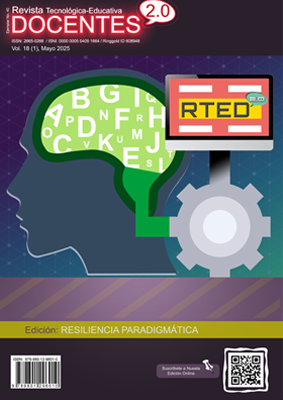Incidence of Pedagogical Leadership and Managerial Competencies in Educational Management
 DOI:
https://doi.org/10.37843/rted.v18i1.586
DOI:
https://doi.org/10.37843/rted.v18i1.586
Main Article Content
Abstract
Studies on school leadership address the effectiveness of school management and the factors associated with the quality of education, which are evidenced in learning achievements. The research objective was to determine the impact of pedagogical leadership and managerial skills on educational management in an educational network in Metropolitan Lima - 2023. The methodology presents a hypothetical-deductive method, positivist paradigm, quantitative approach, non-experimental design, correlational-causal and cross-sectional type. The sample consisted of 186 teachers from a network of public educational institutions. The technique used in this study was the survey. Three questionnaires were used to collect information about pedagogical leadership, managerial skills, and educational management in the educational institutions belonging to the network. According to the McFadden test, the statistical analysis Pseudo R-square showed that pedagogical leadership and management skills influence educational management with p = 0.000 < 0.05. It was concluded that pedagogical leadership and educational management influence 20.8% of educational management in the institutions of the educational network under study.
Downloads
Metrics
Article Details

This work is licensed under a Creative Commons Attribution-NonCommercial-NoDerivatives 4.0 International License.
Those authors who have publications in our journal accept the following terms:
- When a work is accepted for publication, the author retains rights of reproduction, distribution of his/her article for exploitation in all countries of the world in the format provided by our magazine and any other magnetic medium, optical, and digital.
- Authors will retain their copyright and guarantee the journal the right first to publish their work, which will be simultaneously subject to the Creative Commons Acknowledgment License (Attribution-NonCommercial-NoDerivatives 4.0 International (CC BY-NC-ND 4.0)). That allows third parties to copy and redistribute the material in any medium or format, under the following conditions: Acknowledgment - You must properly acknowledge authorship, provide a link to the license, and indicate if any changes have been made. You may do so in any reasonable way, but not in a way that suggests you have the licensor's endorsement or receive it for your use. NonCommercial - You may not use the material for a commercial purpose. NoDerivatives - If you remix, transform, or build from the material, you cannot broadcast the modified material. There are no additional restrictions - You cannot apply legal terms or technological measures that legally restrict you from doing what the license allows.
- Authors may adopt other non-exclusive license agreements to distribute the published version of the work (e.g., deposit it in an institutional archive or publish it in a monographic volume) provided that the initial publication in this journal is indicated.
- Authors are allowed and recommended to disseminate their work through the Internet (e.g., in institutional telematic archives, repositories, libraries, or their website), producing exciting exchanges and increasing the published work's citations.
- Request of withdrawal an article has to be done in writing by the author to the Editor, becoming effective after a written response from the Editor. For this purpose, the author or authors will send correspondence via e-mail: [email protected].
- The author will not receive financial compensation for the publication of his work.
- All Docentes 2.0 Journal publications are under the Open Journal System (OJS) platform at: https://ojs.docentes20.com/.
References
Andrade, L., Rodríguez, C., Rivera, D., Carrión, G., & Beltrán, A. (2022). Storytelling: Como Contar Historias Desde la Educación. Universidad Politécnica de Valencia.
Aparicio Molina, Y. (2020). Storytelling: El arte de contar historias que emocionan. (1ra ed.). Ediciones Pirámide. https://n9.cl/96im3
Burke, B. (2016). Gamify: How Gamification Motivates People to Do Extraordinary Things. Routledge. DOI: https://doi.org/10.4324/9781315230344
Chou, Y. K. (2015). Actionable Gamification: Beyond Points, Badges, and Leaderboards. Octalysis Media.
Creswell, J. W. (2009). Research design: Qualitative, quantitative, and mixed methods approaches. Sage Publications.
Coronado Terrones, J., & Vilchez Marreros, R. (2024). La Gamificación en el Desarrollo de la Competencia Histórica. Revista Tecnológica-Educativa Docentes 2.0, 66-78. https://doi.org/10.37843/rted.v17i1.417 DOI: https://doi.org/10.37843/rted.v17i1.417
Deterding, S., Dixon, D., Khaled, R., & Nacke, L. (2011). From game design elements to gamefulness: defining" gamification". Proceedings of the 15th international academic MindTrek conference: Envisioning future media environments, 341., 3-15. https://doi.org/10.1145/2181037.218104 DOI: https://doi.org/10.1145/2181037.2181040
Diario Oficial de la Federación. (2021). Ley General de Educación superior. Nueva Ley DOF 20-04-2021, pp. 1-48. https://n9.cl/o4fdaa
Dichev, C., & Dicheva, D. (2017). Gamifying education: What is known, what is believed, and what remains uncertain: A critical review. International Journal of Educational Technology in Higher Education, 14(1), 9. https://doi.org/10.1186/s41239-017-0042-5 DOI: https://doi.org/10.1186/s41239-017-0042-5
Espinosa Ríos, E. A. (2020). Mediación didáctica, un reto para la formación docente. Programa Editorial Universidad del Valle. https://n9.cl/glnqhu DOI: https://doi.org/10.2307/j.ctv1k03nmv
Hamari, J., Koivisto, J., & Sarsa, H. (2014). Does gamification work? A literature review of empirical studies on gamification. 47th Hawaii international conference on system sciences. (pp. 3025-3034.). https://doi.org/10.1109/HICSS.2014.377 DOI: https://doi.org/10.1109/HICSS.2014.377
Hernández Sampieri, R., Fernández Collado, C., & Baptista Lucio, M. d. (2014). Metodología de la Investigación. McGRAW-HIL.
Kapp, K. M. (2012). The Gamification of Learning and Instruction: Game-based Methods and Strategies for Training and Education. Pfeiffer. DOI: https://doi.org/10.1145/2207270.2211316
Kolb, A., & Kolb, D. (2017). The Experiential Educator: Principles and Practices of Experiential Learning. EBLS.
Kolb, D. (1984). Experiential learning experiences as the source of learning development. Prentice Hall.
Matus, P. (2019). Storytelling: Una guía práctica para narrar historias efectivas. Maletin Editores.
McKenney, S., & Reeves, T. (2021). Educational design research: Portraying, conducting, and enhancing productive scholarship. Medical education, 82-92. https://doi.org/10.1111/medu.14280 DOI: https://doi.org/10.1111/medu.14280
Morgan, D. (2014). Pragmatism as a Paradigm for Mixed Methods Research. In Integrating Qualitative and Quantitative Methods: A Pragmatic Approach. pp. 25-44. DOI: https://doi.org/10.4135/9781544304533.n2
Reeves, T. C. (2020). Enhancing the Worth of Instructional Technology Research through“Design Experiments” and Other Development Research Strategies. International Perspectives on Instructional Technology Research for the 21st Century, 29.
Rondón, G., & Pérez, R. (2018). Formación Docente y Pensamiento Crítico en Paulo Freire. CLACSO. https://n9.cl/y6roj DOI: https://doi.org/10.19052/ap.5409
Sánchez Mendiola, M., Martínez Hernández, A., & Torres Carrasco, R. (2023). Formación Docente en las Universidades. UNAM. https://n9.cl/lahjb






